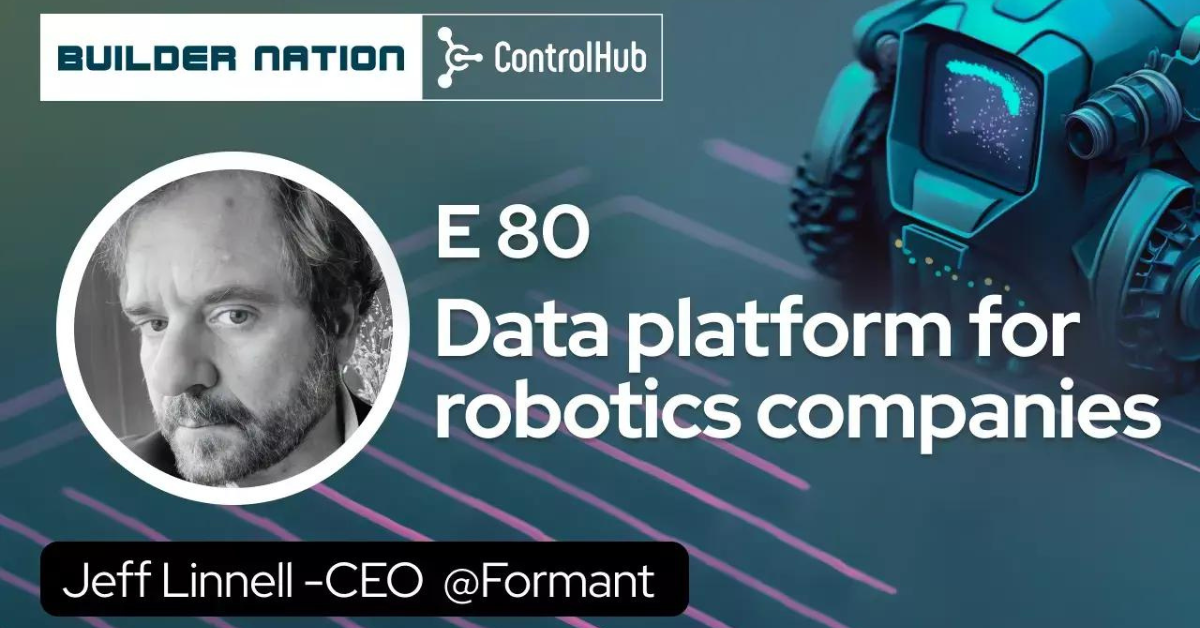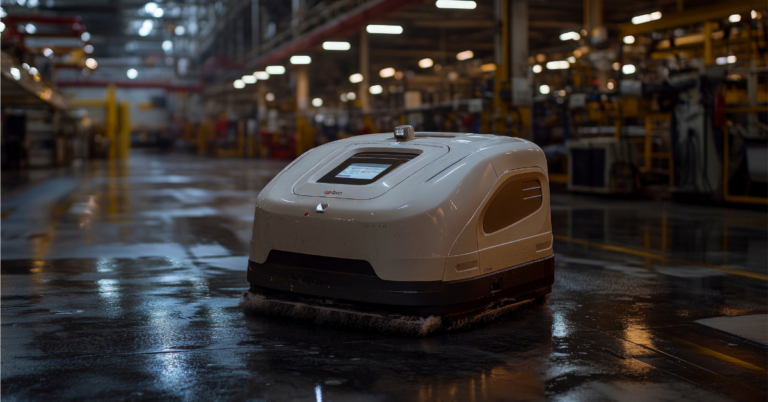Jeff Linnell, our CEO and Founder, joined Builder Nation’s podcast host Elisa Muñoz to share his experiences building a cloud-based data platform and the insights he’s gained from his experience working in the robotics industry.
In today’s highly competitive business landscape, data has become the driving force behind companies’ success and is essential for proving their value to prospective customers. The same holds for robotics companies that rely on data to optimize their robot operations and enhance performance.
We’re very grateful to Builder Nation and Elisa for hosting Jeff to discuss the benefits of cloud platforms for robot operations, our challenges, and his wisdom for younger robotics companies.
BuilderNation is a community of hardware leaders that are developing world-changing products, and is sponsored by ControlHub, the purchasing software for hardware companies.
Transcript:
Jeff Linnell: I’m Jeff, I’m based in San Francisco. I am the c e o and founder of Formant.IO. And let’s see, we’re based in San Francisco, but really virtually just like every other progressive company in the world today. So maybe a little bit of background. I am a cliche early-stage founder. Had my first company at 20 and I’ve had far too many to count at this point. Everything from design agencies, film studios, internet 1 0 2, 0 3, and now a series of robotics companies.
Elisa Muñoz: Great, thank you Jeff. I was going through the website and I noticed that you guys are working with Robotire by powering the tire-changing system. I thought this was great. So, could you please share a little bit about it and how this partnership started?
Jeff Linnell: Oh, sure. Yeah, yeah. Robotire is great. We’ve actually known them for quite some time. We shared a space in San Francisco about three years ago. The company has since moved on and they’re doing quite well. Got a bunch of pilots going and they use us to monitor their robots, find out how, how things are going. But you know, they are a great example of the types of companies that we work with. They’re doing something very specific, and every one of our customers is doing something very specific. And this is sort of what I love about the state of automation right now, is that people are finding these rifle shots that are automatable and they’re attacking them. And so RoboTire actually, you know, you pull your car into a tire changing bay, like, you know, like Big O Tires or something like that is, is the analog equivalent. And robots actually take the wheels off and change tires and put them back on. So it’s a, you know, a relatively understood task. It’s relatively dimensionally constrained and it seems like they’re having some, some great success with that. So they’re using industrial robots and with some custom tooling and they monitor that operation through format. But they are, they’re sort of an example of, of, like, I had a very specific task, but we’ve got a lot of customers in agriculture, last-mile delivery, inspection, floor cleaning, lawn mowing, underwater robots, flying robots, you name it.
Anything that can be automated is being done by a startup or a large company. And we’re working with, with all sorts of folks to us as a robotic data platform and observability platform and kind of issue resolution system. You know, they all, all these robots, even though they, their morphology is very different. They have different tasks, they all look the same from a data perspective. They’ve got some cameras, they’ve got maybe an IMU on there, they’ve got lidars and then they wanna know their battery level, CPU, you know, memory constraints, all sorts of stuff. So all the data is the same from all these machines, even though the jobs that they’re doing are radically different. So yeah, we love it. It kind of keeps us on our toes and we get to meet all sorts of cool companies. You know, we probably have a pretty unique perspective on the state of, I guess, automation at the moment because of all the people we get to talk to.
Elisa Muñoz: You mentioned the partnerships. So what do you think has been the biggest challenge while getting these or, venture capital?
Jeff Linnell: Oh, sure. Yeah. You know, it’s, this is, I’ve had quite a few companies, and this is the first one, however, that is venture-backed. And so that was new to me when I started. I certainly have had experience with m and a and things like that, and my last two companies were acquired by Google. So I’ve seen, I’ve seen that movie I spent, you know, that was, that was quite a process. And I spent a bunch of time inside of Google working in robotics. But then I got out and I, and I started this and it was the first time that I raised venture capital. I found that it was actually, well, I, let me see, I, at the beginning it was actually quite easy because robotics is super exciting as you progress in your evolution as a company, you know, the criteria changes at the beginning. It’s, “Hey, here’s a, here’s a relatively intelligent guy, seems like he’s got a, a regional perspective on robotics and, and here’s a vision, and then, you know, raise some capital”. That was great. Now it’s, “Hey, what are the metrics? What’s your ARR, What is the cost of acquisition of customers?”
And so we’re at a very different stage now than we’ve, when we started and held to a different, you know, metrics to, to get things over the line. So we’ve had quite a bit of success fundraising, we’ve got a great board, we’ve got a great bunch of investors. They’ve been incredibly supportive. So I think we’re, we’re pretty fortunate. And I would suggest that in this really challenging environment right now where money is no longer, you know, as accessible as it was just six months ago, robotics remains one of the bright spots. So as companies, you know, start to, you know, unfortunately lay off staff and, and downsize, people are looking to automate everything they can. So to some extent there’s a, you know, maybe a silver lining in this, in this dark cloud of the fundraising environment right now for automation and robotics companies. So we think we’re, we’ll be good and we think that most of our customers are gonna get through this. But, you know, we just, I don’t think anybody knows how long it’ll take till it turns around.
Elisa Muñoz: So now that we’re talking about it, I would like to ask you: What do you think is the future of robotics?
Jeff Linnell: Yeah, well, let’s see. You know, I was saying I think that everything that can be automatable is going to be automatable. And so that’s just repetitive tasks. We all know that it’s the dirty doll and dangerous things that robotics are, are, are good at. But it’s also, you know, the mundane, it’s things like digging ditches for foundations. It’s mowing lawns. It’s, we’ve got companies that are doing very well, finishing drywall, you know, it’s actually in, in robotics. That’s sort of the bigger opportunities tend to be relatively mundane and, and, and boring. But large scale and tractable, you know, it’s actually, robotics is hard. Let’s start with the simple stuff that’s big and, and can get done. You know, I think that we’ve had a, maybe a misconception historically and that everybody’s looking at the Jetsons or R two D two or whatever, or C3 po and they want all these amazing capabilities of these machines where we’re, you know, enthusiastic about them. We, they’re imaginative, but it’s the ones that are actually doing work that excite me. It’s like a lawnmower, you know, there’s a lot of grass out there that needs maintenance, you know, on solar farms or, or at hotels or campuses, and those are really amazing opportunities. Things like weeding on a farm.
We’ve got a lot of customers in agriculture, and I spent a fair amount of time out there, and it’s a really brutal job for humans to be out there all day long. It’s not healthy. I think that it’s much more interesting to let those humans be in the truck or in a warehouse somewhere or at a facility. They could even be thousands of miles away, but watching those machines, helping those machines do their jobs. So I think we’re gonna see more of that. We’re gonna see human-backed robotics, remotely-backed robotics. And so that’s really what our company does. We allow you to connect to a robot in real-time, get it out of a problem, see how it’s doing, make some decisions for it. But I think that the future of automation is remotely operated automation equipment. And I think it’s, you know, we’re, we’re seeing quite a bit of that. And maybe I’ll just double down on it, it’s not human-back robotics is how this is really gonna happen. We’ve got another decade or two of people being very, very much involved in autonomy handling the edge cases. And so, you know, I think that data platforms and connectivity are going to be at the center of that. I’m very proud to be, you know, helping all these startups with that infrastructure and connecting to those robots because that’s the way this thing really works.
People have been dreaming about autonomous operations that just magically work for the last 30, 40 years, and there’s not a whole lot of them out there, but human-backed automation, robotics is how this thing actually gets some traction. And I think that’s, you know, I think that’s the next, that’s the near term, but actually probably the long term as well. And so, you know, that’s, that’s, that’s my point of view on where automation’s going, you know, over the next decade.
Elisa Muñoz: We’ve been talking with different CEOs in the industry and most of them are really involved in the procurement process, especially through the pandemic. That was a really rough time for companies in general. So how was that process like for you?
Jeff Linnell: It was actually, it’s funny because I started my last company in 2008, which was when the market tanked and we did very, very well. So I, I feel like there’s a, I don’t know, some somehow adversity can be, I don’t know, serendipitously a, a benefit. And so for my company, we found that, you know, everybody couldn’t come into the office anymore and sit around their robot and debug it. So everybody wanted to beam into the robot and look at the systems and collaborate online. All the engineers would, would, you know, be logging into their robots from their couch or whatever. And so it was sort of the start for us of actually letting people continue to progress for those, you know, two, three years we became more valuable. And so it was exciting. I think that there was a little bit of a, it was still early at the beginning of the pandemic, people didn’t realize that you could buy a platform like for, and, and, you know, not have to build all that infrastructure. So there was a little bit of education, but once people figured out this was a way to actually continue to test and get things done with robots, you know, you would need somebody at the office to turn it on or to restart it or whatever. But, you know, the other four or five people can be online looking at it real-time, restarting systems, debugging things, looking through the robot’s eyes.
And so it actually was, we had some pretty good years there. We grew substantially during the pandemic now that everybody’s back, that there’s been a, a sort of a turbocharge of, of people needing to get their robots out in the field and keep an eye on them. And so we had a very good year last year as people came back to work. But the pandemic was, you know, actually okay for us because we were a company that enabled online, you know, visualization of robotic data.
Elisa Muñoz: Okay. And you mentioned the engineers, right? So on your day-to-day, how close are you with this team?
Jeff Linnell: Oh, I’m incredibly close. You know, it’s a funny thing. It’s a challenge for a founder like me anyways. I’m not a, you know, I’m a, I’m a doer and I, I can’t keep myself out of the product. I can’t keep myself out of engineering. Maybe a little too much in there, to be honest. But, you know, as the c e o, my primary responsibility is to raise capital. And, and, and so I have to take that very seriously. But I care deeply about customer experience. I care deeply about the aesthetics of our UX, I care about the go-to-market strategy and, you know, so I’m, I’m in the standups daily, I’m having a, I dive into details, you know, it’s, it’s, it keeps me relevant. I learn a lot about, you know, cloud infrastructure, which is not my background, but I’ve got a whole bunch of, you know, folks on my team that, that’s, that’s, they’re, they’re experts in scaled backend systems. It’s new to me. So I, it’s exciting for me. I can’t help myself. I wish there was, you know, another, you know, 20 hours in the day or whatever, and I could do, do everything. But I think it’s, it’d be dangerous for me to remove myself too far from the actual technology. So as we grow, I’m looking, I amplify my team with more, you know, business-focused executives that can, can help us scale. Because you know, I’m very much an early-stage person. You know, I love the zero to a hundred of a company. I’ve worked at very large companies and I hope this becomes a very large company, but it’s so much fun in the beginning cuz you get to do so many things.
Elisa Muñoz: What advice would you give to future entrepreneurs or CEOs in the industry?
Jeff Linnell: I think with robotics specifically, it’s so important to get that feedback cycle of putting the device out into the universe as quickly as you can start your field trials, break your machine. Nothing is precious. Like continue to revise and revise. You know, I think that one of the most well-known robotics companies and successful robotics companies, Boston Dynamics, you know, literally has been throwing their robots down hills and kicking them and putting them on ice from day one. And that’s why they have the most advanced systems in the world. And so I think people should, you know, look at that and say, that’s how you do it. You know, go out and break some things. And I think that maybe that’s, you have that flexibility at a startup to break all sorts of things. You can break your robot, you can break your processes, you can try things, you know, it gets a lot harder when the company scales to make big moves. And so do it while you’re, while you’re, while you’re starting out and you’ve got, you could affect more change in, if the risk is lower or so break things.
Elisa Muñoz: Thank you so much Jeff for taking the time and joining the podcast today.
Jeff Linnell: All right, have a great day.
To learn more about Formant, get a demo with our team.



